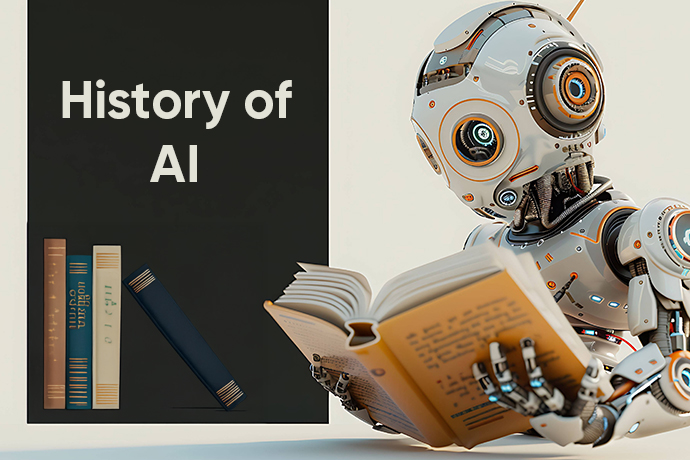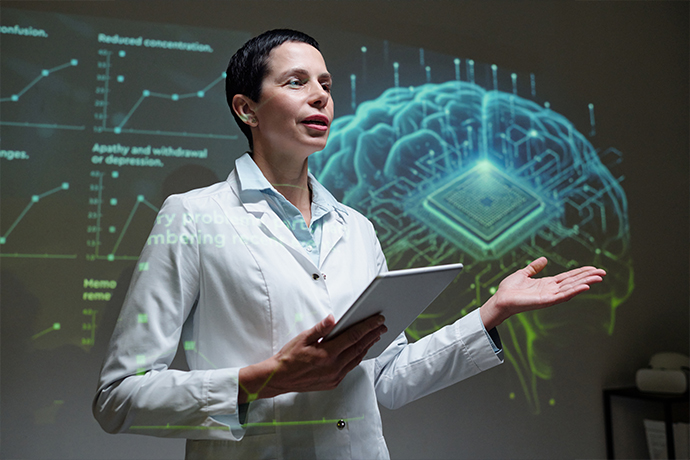 SPEAKERS
SPEAKERS
 TOPICS
TOPICS
Explore the inspirational journey of artificial intelligence from its inception to now. Discover key milestones and pioneers who shaped its path.

Have you ever found yourself pondering the remarkable history of artificial intelligence? This field, once thought to exist only within the realms of science fiction, has burgeoned into a transformative force that is reshaping industries and societies worldwide.
The history of artificial intelligence offers a journey replete with extraordinary tales of visionaries who dared to dream beyond the limitations of their time. The inception of AI was a tapestry woven with divergent theories and experiments, laying a robust foundation for what we have today.
Today, AI's impact transcends its humble beginnings, often surprising even its greatest advocates. It invites us to reflect on how far we've come and inspires the next wave of breakthroughs that are only a curious mind away.
The origin of artificial intelligence can be traced to the mid-20th century. Visionaries like Alan Turing laid the conceptual groundwork with ideas that seemed far-fetched at the time. This era was the dawn of an exciting intellectual awakening. Discussions were charged with optimism and a sense of potential, propelling thinkers to explore uncharted territories with determination and curiosity.
The 1950s witnessed the inception of ideas that would later evolve into sophisticated technologies. The introduction of the Turing Test in 1950 was a radical idea. It suggested that machines could potentially exhibit human-like intelligence, urging many to reconsider the capabilities of mechanical systems.
Further milestones marked this period, as in 1955, when researchers developed the "Logic Theorist," the first AI program. This program could prove mathematical theorems, challenging conventional wisdom and demonstrating the possibilities of digital computation. Such developments ignited a spark of hope among scientists and theorists dedicated to advancing this burgeoning field.
The pivotal Dartmouth Conference in 1956 represented a formal declaration of AI as a distinct field of study. This gathering of brilliant minds was where the very term "artificial intelligence" was coined. The participants deliberated on how machines could perform tasks that, when done by humans, require intelligence. It was a period of explosive creativity, where the aim was to emulate human cognitive processes in machines.

Many often ask, when was AI first invented? It wasn't a single act of creation but rather a series of pivotal moments. The 1950s and 60s saw the first AI programs emerge, setting the stage for future advancements.
The journey of AI began with the pioneering work of researchers who believed in the potential of machines to mimic human thought processes. It was a period marked by bold experimentation and the courage to challenge established norms. Each step forward in the origin of artificial intelligence was a triumph of human ingenuity.
The role of organisations and individuals can't be overstated. Azeem Azhar's perspective on AI's evolution showcases the dynamic nature of AI development. His contributions highlight the collaborative spirit that has driven AI innovation.
From conceptual ideas to functional programming, each milestone was more than just technical progress; it was an embodiment of the relentless pursuit of knowledge. Through dedication and creativity, the early architects of AI opened doors to future technologies that seemed impossible at the time.
The history of artificial intelligence timeline is dotted with significant landmarks. From the foundational advancements in the mid-20th century to more contemporary breakthroughs, AI's evolution is a testament to human curiosity and ingenuity:
Each phase in the history of artificial intelligence offers unique insights into the challenges faced and obstacles overcome by pioneers in the field. As Ben Owen emphasises, the field's adaptability and resilience are what have sustained its growth. This story is not just about technology but about the persistent drive to push the boundaries of what machines can achieve, continually redefining the possible.

Often underlined by the industry expert Bas Lansdorp, the artificial intelligence discovery has transformed numerous industries, sparking creativity and innovation. From healthcare to entertainment, the influence of AI is far-reaching and continues to expand every day. The profound impact it has had on sectors such as finance, where algorithms now perform complex analyses, demonstrates the depth of AI's integration into modern life.
For example, in healthcare, AI is revolutionising patient care. By assisting in diagnostic processes and managing patient data more efficiently, AI systems support medical professionals in delivering accurate and timely treatment. The entertainment industry is another arena where AI shines brightly. From creating immersive video game experiences to generating personalised movie recommendations, AI enhances our interaction with media in previously unimaginable ways.
Today's world marvels at AI's ability to augment human capabilities. With insights from Bianca Lopes, an AI expert, one can explore how technology speakers are pushing boundaries, transforming lives, and imagining new possibilities. They highlight the role of AI in making groundbreaking strides in fields like autonomous vehicles and smart home technology, which redefine convenience and push the limits of what machines can achieve.
Reflecting on the early history of artificial intelligence, one can't help but be inspired. Early pioneers had a vision of machines not just as tools, but as entities capable of learning. Their dreams sparked a revolution that continues to unfurl in astonishing ways. In the years following the initial conceptions, the landscape of AI was a fertile ground for innovation, with researchers laying down the building blocks that have shaped the field as we know it today.
Amongst these trailblazers were figures who dared to dream of machines with the ability to understand and respond to the world around them. The very fabric of society was poised for transformation, with these early concepts influencing a range of sectors from academia to industry. Thus began a period of fervent research and experimentation, with scholars pushing the boundaries of imagination in pursuit of tangible progress.
Just as the journey of AI is ongoing, so is our exploration. With each innovation, we step closer to realising ambitious dreams that were once deemed impossible. AI is not just technology; it's a testament to the relentless human spirit. The breakthroughs witnessed in those early years were bouts of creativity and perseverance, foundations upon which modern advancements continue to be built.